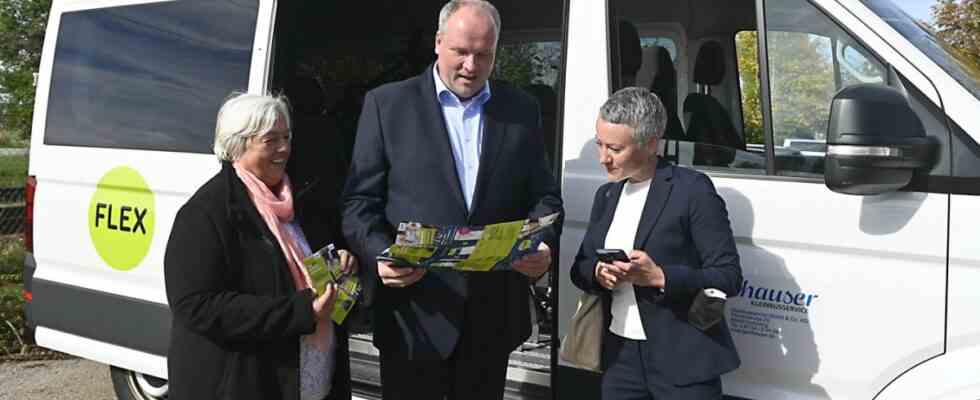The last mile can sometimes be quite a long one. Especially at night or in rural areas. When buses and trains no longer run or have never driven to remote areas of the community, the only option for the rest of the way home is often the car. With a pilot project, the Munich Transport Association (MVV), together with the district of Munich, now wants to close this gap and also promises a high level of flexibility. Accordingly, this on-demand transport, which is initially offered in the south-east of Munich, is called “Flex”. From Monday onwards, seven minibuses will be on the move in day and night traffic between almost 250 entry and exit points, without any rigid timetables or set routes, but entirely according to the needs of the passengers.
Call buses or collective taxis are not a completely new invention, they have long been used elsewhere. With this offer, however, a completely new flexible type of mobility will be created, said district administrator Christoph Göbel (CSU) on Friday in Aying at the start of the initially two-year model project. MVV Managing Director Bernd Rosenbusch also pointed out that this form of on-demand service will be unique in Germany to date. “It is integrated into the MVV, does not cost a surcharge and can be booked with the new MVV app,” he emphasized.
The Flex idea will first be tested in two areas with different times. In the communities of Unterhaching, Oberhaching and Taufkirchen, passengers can order the minibus daily from 10 p.m. to 6 a.m. “Instead of waking mom up at night”, the MVV advertises this offer in the suburban area west of the A8 motorway and, with stops at Munich Ostbahnhof and the Neuperlach Süd station, also offers a connection to the night traffic of the state capital. The remote districts of Oberhaching such as Jettenhausen and Gerblinghausen are also approached.
The Flex-Bus will be on these routes during the test phase.
(Photo: District Office Munich)
During the day, the same seven vehicles from the Geldhauser company are then on the road between 5 a.m. and 10 p.m. in the municipal areas of Sauerlach, Aying and in southern Brunnthal. The fact that they don’t drive here at night led to the first complaint from Otterloh to Sauerlach’s mayor, Barbara Bogner. After all, that’s the time when nothing drives, and now neither does the flex bus. The MVV points out that there are initially two test areas in which the two variants are tried out in order to gain as broad a range of experience as possible. If necessary, the offer should then be extended until December 2026 and then made permanent. The pilot project is intended to serve as the basis for further on-demand services in the district of Munich and possibly beyond.
Due to delivery bottlenecks, white buses will start first, blue-green ones will follow later
The Flex-Bus doesn’t take you all the way home like a taxi would. However, it stops at the well-known MVV regional bus stops and at 100 additional entry and exit points in the participating pilot municipalities. You can recognize the stopping options offered by a green-blue sign with the inscription “Flex”. The buses are also marked accordingly. The seven-seater will soon attract attention with its dark blue color, light green stickers and Flex logo. Due to delivery bottlenecks, however, white vehicles will initially be on the road at the start of the coming week.
You can book the Flex bus using the MVV app.
(Photo: Claus Schunk)
Journeys with the Flex-Bus can be booked spontaneously or in advance using the new MVV app, the MVV information service or by telephone. Long-term bookings are also possible. The passenger will then be told the nearest stopping point to the start and destination. The MVV promises that the bus will be there and pick up the passenger within 15 to 20 minutes. An algorithm that brings together journey requests with a similar course then decides which route to take. This should make better use of the vehicles, reduce detours and save on unnecessary journeys. The Flex-Bus can be used with the usual MVV tickets valid in the respective tariff zone, which will soon also be available for purchase in the vehicles. Only the short-distance regulation does not apply. There are two child seats on the buses for transporting children, and wheelchairs and prams can also be transported. Dogs are not allowed to ride – except service dogs such as guide dogs.
The pilot project costs around 1.4 to 1.7 million euros a year and is initially funded by the Free State of Bavaria with 65 percent and later 40 percent. Transport Minister Christian Bernreiter (CSU) said: “People want to get from A to B quickly and without detours. If we want them to leave their cars at home and use public transport, we have to create the right offer.” District Administrator Göbel is convinced that this flexible offer represents “considerable added value” for the citizens of the district. If the pilot project has the hoped-for success, “there could be a real boost to reducing motorized private transport and public transport”.
The Flex-Bus can be booked via the new MVV app, which has already been activated for Android users. The MVV app beta (www.mvv.app/beta) must first be used on iOS devices. Bookings are also possible at www.mvv-auskunft.de and by telephone (089/41 42 43 44).

